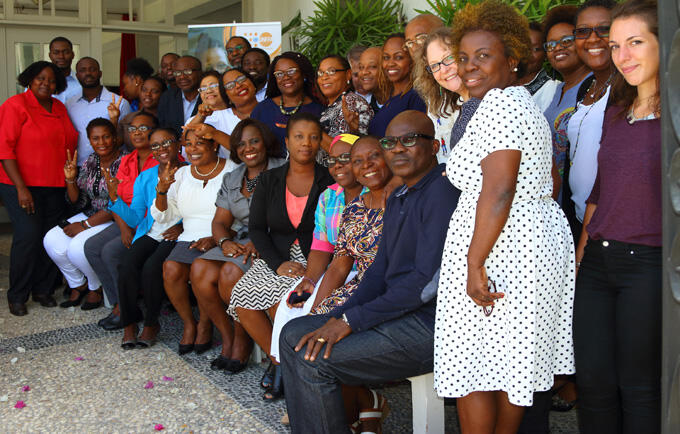Port-au-Prince, Haiti, 9 August 2018 --- More than 50 representatives of organizations and institutions working on humanitarian risk management participated on 31 July and 1 August 2018 in a workshop on the development of the contingency plan on sexual and reproductive health (SRH) and gender-based violence (GBV) for the 2018 hurricane season.
This was an initiative of UNFPA, the United Nations Population Fund, in collaboration with the Ministry of Planning and External Cooperation (MPCE), the Ministry of Public Health and Population ( MSPP), the Ministry of Women Affairs and Women's Rights (MCFDF), and the Office for Coordination of Humanitarian Affairs (OCHA) and the Civil Protection Directorate. Two humanitarian experts from UNFPA headquarters in New York, Sadiku Adjao and Prudence Chaiban, were the facilitators during the workshop.
This workshop, which brought together participants from both departments and the central level, allowed to analyze the scenario implemented during the SIMEX for the preparation for the hurricane season, in order to define the framework of intervention in case of crisis humanitarian. It also made it possible to inventory the risks and hazards of the various target departments in order to determine the prevention and harmonized response capacities according to well-defined coordination mechanisms. The workshop finally made it possible to identify national coordination mechanisms, provide decision-making chains and lines of intervention and strengthen the capacities of national partners on the prevention, mitigation and response to sexual and reproductive health ( SRH) and gender-based violence (GBV) in emergencies.
"Gender-based violence is often neglected in relation to the primary needs of the population when a natural disaster strikes, whereas these tend to increase in such circumstances," the Minister for Women's Affairs and Women's Rights, Eunide Innocent, said, adding that it seemed important to her to reinforce this workshop by her presence.
The Representative of the Ministry of Planning and External Cooperation (MPCE) to this activity, Jean Max Gabriel, Chargé de mission at the Directorate of Territorial Planning and Local Development, found the work to be very fruitful, promising to support partners, while ensuring that their work is in line, in general, with the country's Strategic Development Plan.
"Emergency preparedness is the key to making the humanitarian response a success," UNFPA Deputy Representative in Haiti said. "If we are better prepared, in the event of a crisis, it is not what we want, the actors will be able to provide a rapid response and support the Government in its efforts," Rachelle Mian Djangone said. .
In the same vein, OCHA's Office Manager in Haiti, Salima Mocrani, expressed the wish that, in case where a climatic event would affect the country, "we could have put in place all the necessary preparations, all the necessary mitigations, so that the impact is as low as possible ".
Haiti is one of the most vulnerable countries in the Caribbean in the face of climate change. The risk management index (INFORM) gives Haiti a risk level of 6.5 on a ranking of 15 globally, compared with an average of 2.5 for the other Caribbean countries. On the hurricane’s path and at the border of two tectonic plates, Haiti must manage major natural risks which periodically result in thousands of deaths, not to mention the material losses. In 2016, the damage caused by Hurricane Matthew was evaluated at $ 2 billion, which represents 20% of the national GDP.


